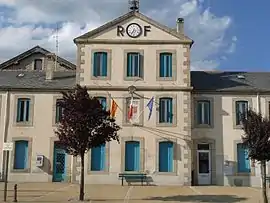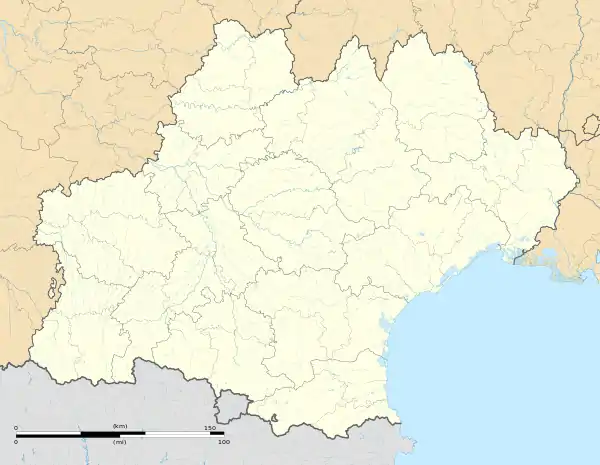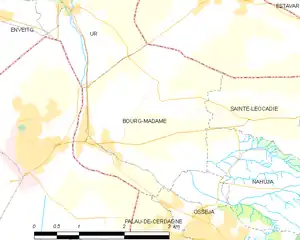Bourg-Madame
Bourg-Madame (French pronunciation: [buʁ madam] ⓘ; Catalan: La Guingueta d'Ix) is a commune in the Pyrénées-Orientales department in southern France.[3]
Bourg-Madame
La Guingueta d'Ix | |
|---|---|
 The town hall in Bourg-Madame | |
 Coat of arms | |
Location of Bourg-Madame | |
 Bourg-Madame  Bourg-Madame | |
| Coordinates: 42°26′07″N 1°56′41″E | |
| Country | France |
| Region | Occitania |
| Department | Pyrénées-Orientales |
| Arrondissement | Prades |
| Canton | Les Pyrénées catalanes |
| Intercommunality | Pyrénées Cerdagne |
| Government | |
| • Mayor (2020–2026) | Daniel Armisen[1] |
| Area 1 | 7.85 km2 (3.03 sq mi) |
| Population | 1,203 |
| • Density | 150/km2 (400/sq mi) |
| Time zone | UTC+01:00 (CET) |
| • Summer (DST) | UTC+02:00 (CEST) |
| INSEE/Postal code | 66025 /66760 |
| Elevation | 1,130–1,235 m (3,707–4,052 ft) (avg. 1,130 m or 3,710 ft) |
| 1 French Land Register data, which excludes lakes, ponds, glaciers > 1 km2 (0.386 sq mi or 247 acres) and river estuaries. | |
Geography
Localisation
Bourg-Madame is located in the canton of Les Pyrénées catalanes and in the arrondissement of Prades. It lies right on the border with Spain. It abuts directly onto the Spanish town of Puigcerdà, and is near the Spanish exclave of Llívia.

Toponymy
The town used to be known in French as Les Guinguettes,[4] until 1815 when it was renamed Bourg-Madame in honour of the wife of the Duke of Angoulême. The Catalan name for the town is still the traditional one.
History
In the 20th century Bourg-Madame was the site of a camp housing Republican escapees from Spain at the end of the Spanish Civil War.[5]
Government and politics
Transport
Roads
The following major roads lead to Bourg-Madame:
- N-20 from Ur to the north;
- N-154 and D-68 from the Spanish enclave Llívia to the northeast;
- N-116 from Saillagouse to the east;
- D-30 and D-70 from Osséja and Palau-de-Cerdagne to the southeast;
- N-152 from Puigcerdà to the west.
Railways
Bourg-Madame is located at a key point of intersection for railways that link Toulouse, Barcelona, and Valencia (as well as Perpignan to the east via the Yellow Train).
The railway station is located in the Arena district.
Population
|
|
References
- "Répertoire national des élus: les maires". data.gouv.fr, Plateforme ouverte des données publiques françaises (in French). 2 December 2020.
- "Populations légales 2020". The National Institute of Statistics and Economic Studies. 29 December 2022.
- INSEE commune file
- Jtosti.com
- Beevor, Antony (2001). The Spanish Civil War. London: Cassell Military Paperbacks. p. 394. ISBN 0-304-35840-1.
- (in French) Fabricio Cardenas, Vieux papiers des Pyrénées-Orientales, Bombardement collatéral en Cerdagne, janvier 1938, 23 december 2014
- (in French) L'Indépendant, La parole aux deux nouveaux sénateurs, 5 october 2011